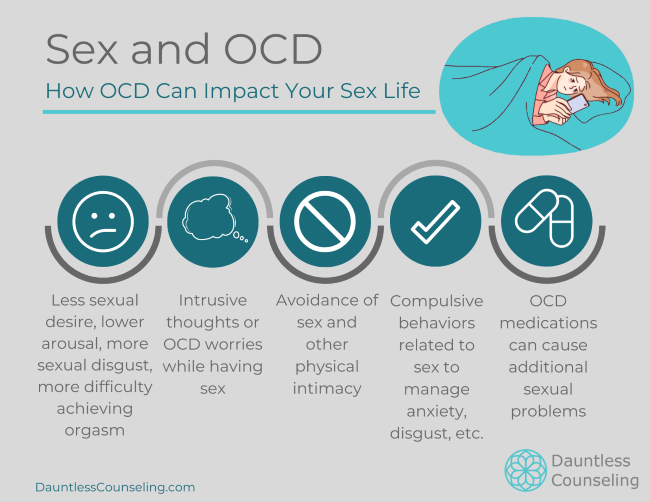Living with OCD can negatively impact many aspects of life, including intimacy and sexual experiences. If you’re struggling with the effects of OCD on your sex life, you’re not alone.
Research confirms that OCD can significantly impact your ability to enjoy and engage in sexual activities. As a clinician who has worked with many individuals navigating OCD, I’ve witnessed firsthand the complexities and struggles many face in this area.
In this article, we’ll explore the complex relationship between OCD and sex and offer insights and options for those grappling with these challenges.
Table of Contents

Understanding the Impact of OCD on Your Sex Life
OCD can have a number of negative effects on your sex life. While both men and women can experience sexual dysfunction related to their OCD, OCD can even more profoundly affect intimacy for women.
Although studies are somewhat limited, those that have been done have found that women with OCD tend to experience:
- Less sensuality
- Less sexual desire
- Less sexual arousal
- More sexual disgust
- More avoidance of sex
- More difficulty experiencing orgasm
- Less satisfying orgasms
This is even compared to women with other anxiety disorders and regardless of medications. (See the articles “Sexual pleasure in women with obsessive-compulsive disorder?” and “Sexuality in Women with Obsessive Compulsive Disorder” for more information).
Common OCD Worries about Sex
Due to the complicated nature of sex—which involves physical, emotional, and even spiritual aspects—almost any OCD theme can easily latch onto physical intimacy. (If you’re interested in reading more about the various OCD themes, check out my article “OCD – Not What You See On TV: 7 Types and Why OCD Is the Worst.”)
Here are some common examples of sex-related OCD worries by OCD theme [trigger warning]:
Relationship OCD and Sex
- I’m not enjoying sex with my partner as much as usual, what if that means I’m actually with the wrong partner?
- I feel like my partner is not enjoying sex as much as they usually do, what if that means they don’t really love me?
- My partner did something different when we were having sex, what if that means my partner is cheating on me?
- I thought about someone else while I was having sex with my partner, what if that means I’m attracted to them more?
“Just Right” OCD and Sex
- This doesn’t feel just right, I better keep doing this until I can get it to feel just right.
- This doesn’t feel just right, I better stop doing this even though I’m enjoying it.
Contamination OCD and Sex
- What if I get contaminated by having sex?
- What if I can’t get “clean” after having sex?
- What if I contaminate my partner by having sex with them?
Sexual Orientation or Gender Identity OCD and Sex
- I’m not enjoying having sex with my partner, what if that means I’m actually a different sexual orientation than I think I am?
- I’m not enjoying having sex as much as I think I should, what if that means I’m wrong about my gender identity?
Scrupulosity OCD and Sex
- What if God (or the universe) doesn’t approve of what I’m doing (this partner, this position, this timing, etc.)?
- I had a thought about a family member while having sex. What if that means I’m attracted to them?
- What if I’m not a good person because of a sexually related thing that I did?
- What if I’m going to go to hell because of a sexually related thing that I did?
Harm OCD and Sex
- What if I give my partner an STD?
- What if I get an STD or a UTI?
- What if my partner hasn’t fully consented to this?
- What if I’m not fully consenting to this?
Pedophilia OCD and Sex
- Oh no, I thought about a child while I was having sex with my partner. What if that means I’m a pedophile?
Other OCD Worries and Sex
- What if I get pregnant?
- What if we have a child together and I am a horrible parent?
- What if I just can’t handle the responsibilities of parenthood?
In all cases, these worries are not founded on actual evidence in the here and now, but rather are possibilities or doubts about what could happen, fueled by your OCD. You may have taken all reasonable steps and precautions (gotten consent, used appropriate birth control, etc.), however, OCD doesn’t care about any of that.
Many of these thoughts have popped into most people’s heads at one point or another. The biggest difference if you have OCD is that these fears get STUCK and lead to the C in OCD, i.e., compulsions.

Common OCD Compulsions Related to Sex
Compulsions are physical or mental actions taken in order to try and relieve your anxiety, try to prevent something bad from happening, or gain certainty that your worries won’t come true. Every type of OCD has compulsions that come along with the worries.
Some common OCD compulsions related to sex include (but are definitely not limited to):
- Checking for level of enjoyment in self or partner.
- Having sex to check for level of attraction to partner compared to others.
- Repeating certain actions in bed to try to gain clarity, certainty, or a “just right” feeling.
- Compulsively washing or asking your partner to wash before and/or after being intimate.
- Checking for level of attraction to individuals of different genders.
- Compulsively praying for forgiveness or clarity around sex-related actions.
- Repeatedly getting tested for STDs (more often than is warranted or recommended).
- Repeatedly asking your partner for their consent.
- Repeatedly checking if you are really wanting to have sex in that moment.
- Avoiding being around children in case you have an inappropriate thought.
- Repeatedly asking for reassurance around any of your sex-related fears.
- Repeatedly taking pregnancy tests.
- Avoiding engaging in specific sex acts (certain positions or types of sex).
- Having sex less frequently than desired or avoiding sex altogether.
All of these compulsions typically provide short-term relief from the anxiety, uncertainty, guilt, disgust, or other unpleasant symptoms that may be caused by your OCD. Unfortunately, like all compulsions, they will ultimately feed into the cycle of anxiety and make things worse for you in the long run.
In addition to this, many compulsions will directly interfere in enjoying physical intimacy and further exacerbate sexual problems.
OCD Medications and their Impact on Sex
Many individuals who are dealing with OCD find that it is beneficial to take one or more medications to treat their symptoms.
One of the most effective medications for OCD are a type of drug called SSRIs, or Selective Serotonin Reuptake Inhibitors. These are drugs that increase your brain’s access to a chemical called Serotonin, which can affect mood and behavior.
Some of the most commonly prescribed SSRIs include drugs that you may have heard of, including:
- Prozac
- Zoloft
- Celexa
- Lexapro
On a side note, there’s a song called “serotonin” [trigger warning] by girl in red that many have found illuminating and relatable.
While SSRIs may be a helpful, even essential, part of your mental wellness, these medications can also come with a host of unwanted side effects. Some of the possible side effects of SSRIs include:
- Nausea, vomiting, diarrhea
- Headaches
- Drowsiness
- Dry mouth
- Insomnia
- Nervousness, restlessness, or agitation
- Dizziness
- Impact on appetite, leading to weight loss or weight gain
In addition to all of these lovely symptoms (that would definitely put most people in the mood), SSRIs can also directly cause sexual problems, such as:
- Decreased sexual desire
- Difficulty attaining orgasm
- Inability to maintain an erection

How to Cope if OCD Is Impacting Your Sex Life
So now that we have talked about the many ways that OCD can negatively impact your sex life, what can you do about it? The good news is, you have options.
Therapy
OCD is a highly treatable problem. If you are ready to address your OCD through therapy, check out the International OCD Foundation website to find a mental health provider near you.
Look for a therapist who has experience treating OCD specifically and has been trained to use methods that are based on research. Some of the types of treatment that have been found to be effective treatments for OCD include:
- Exposure and Response Prevention
- Acceptance and Commitment Therapy
- Inference-Based Cognitive Behavioral Therapy
Medication
While medication can sometimes exacerbate difficulties with physical intimacy, finding the right medication can be a game changer if your OCD is keeping you stuck. You can again use the IOCDF website to find a psychiatrist near you who is familiar with treating OCD specifically (narrow you search by selecting “Medication Providers” under “Listing Type”).
Once you start your medication journey, it’s important to be open with your doctor about what all of your symptoms are, as well as any side effects that you experience. This way, they can help you to find the best possible medication for you, or explore alternative treatment options when necessary.
Support Groups
Finding a support group that has other individuals who get it can be invaluable. Normalizing your struggles and feeling less alone can make coping with the hell that is OCD more bearable.
As an added bonus, many support groups are free and some can be attended online, even from another state. Here is a free support group for those in California and another free support group for friends and loved ones located anywhere in the world.
Support from Loved Ones
Talking to your loved ones, especially your partner, about what you are going through can also be beneficial. While it is completely up to you how much detail you choose to disclose, open communication with your partner about your OCD-related challenges can be particularly crucial when your OCD is affecting your sex life.

Final Thoughts about OCD and Sex
If you are experiencing difficulties in your sex life due to your OCD, remember that you are not alone and that there are resources and strategies available to improve your sexual (and overall) well-being. I would encourage anyone who is struggling to manage their OCD on their own to seek professional help as well as support from your loved ones. The more we are able to talk and be open about these sensitive topics the more everyone will benefit in the long run!
As a reminder, this blog post is not intended as professional counseling or clinical advice. This article is meant to provide you with some helpful information about the intersection of OCD and sex. If you are struggling with your mental health, I encourage you to consider reaching out for additional support, professional or otherwise.

– Kristel Roper, LMFT, LPCC
Kristel Roper is a licensed psychotherapist offering therapy services to individuals in the Sacramento area. She specializes in therapy for anxiety and OCD and especially enjoys working with young women as they navigate the challenges of relationships, college, career, and beyond. If you have a question for Kristel or are interested in therapy for yourself or your loved one, feel free to reach out.
Photo by Athena on Pexels
Image by mohamed Hassan from Pixabay
